Last Updated: 8 months ago
Recently, a friend of mine shared, “My cat sounds congested when breathing, and I’m losing my mind with worry.”
A few things can make a cat owner panic quicker than a cat with breathing problems.
Fortunately, I’m here to talk about the reasons for noisy breathing in cats.
Just keep reading.
Cat Sounds Congested But Doesn’t Have Discharge
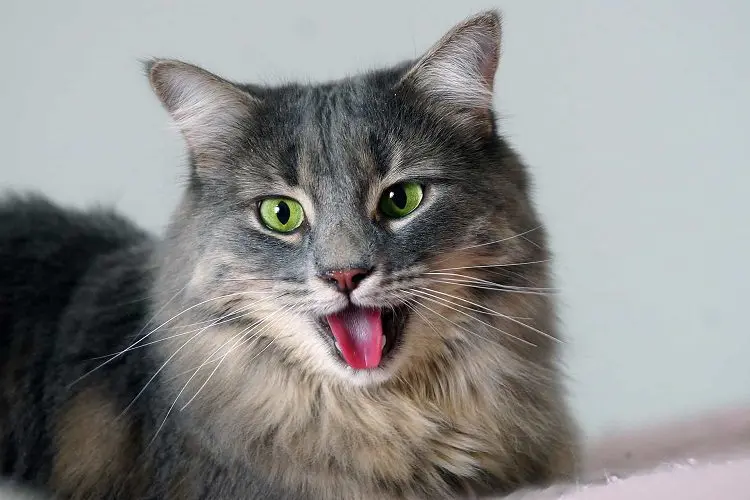
Congestion is the result of excess fluid or mucus building up in the respiratory system. It happens when something irritates these delicate tissues.
Congestion isn’t an uncommon symptom in cats, and a wide range of causes can lead to inflammation of the respiratory system, with or without discharge.
What Are the Signs of Congestion in Cats?
A congested cat will often have a runny nose and other signs of discharge, but it’s possible for a congested animal to not have a mucus discharge.
Other symptoms such as sneezing or coughing can appear. You might notice that your cat breathes with their mouth open or shows signs of dehydration such as pale gum or sunken eyes.
Is Congestion Cause for Concern?
There are many benign causes for congestion in cats, from a common cold to allergies. However, congestion can indicate a more serious underlying medical issue, such as a tumor, an object blocking the nasal airways, or a parasite.
If your cat’s symptoms aren’t improving after 48 to 72 hours, it’s time to take your feline companion to the vet. Schedule an appointment earlier if you notice other symptoms such as lethargy or loss of appetite.
How to Keep Your Congested Cat Comfortable
While you figure out what is causing the congestion, there are a few steps you can take to keep your pet comfortable:
- Place a small pillow under your cat’s head to keep it elevated.
- Give your cat plenty of time to rest and avoid anything that could stress or exert them.
- Prevent dehydration by keeping some fresh water near your cat. Give small amounts of water in a syringe if needed.
- Place a warm compress on your cat’s chest and nose to help open the airways.
- Use a humidifier to create a more comfortable environment.
- If inflammation spreads to the eye, use a saline solution.
What is Noisy Breathing in Cats?
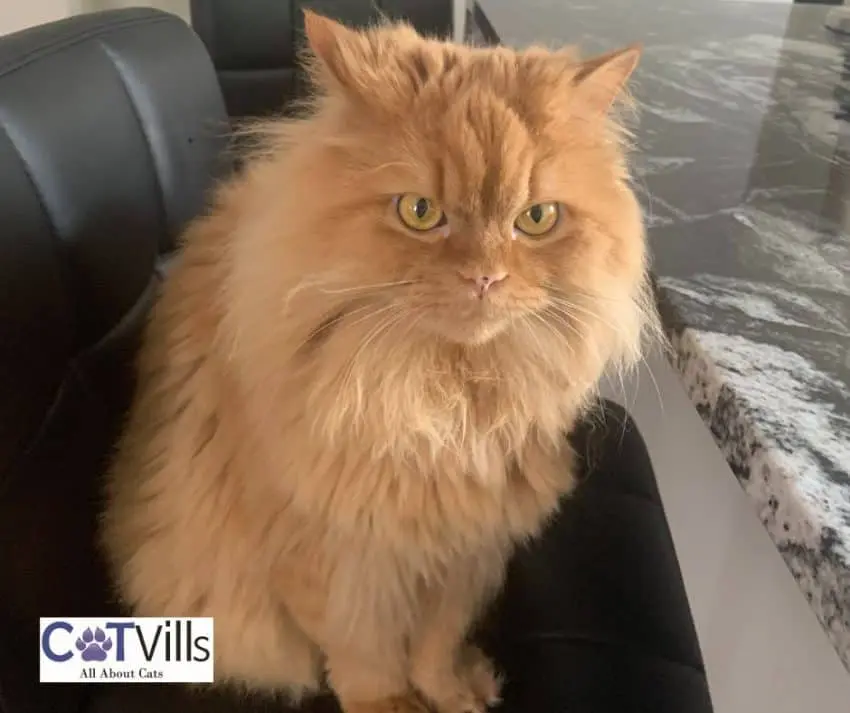
Cats have a faster breathing rate than humans, so it’s normal to notice that your cat takes more breaths than you in a minute.
But is it normal to hear your cat breathing? No, it isn’t.
As specialists from Pet Health Hub explain, “you shouldn’t hear or see your cat breathing unless you look and listen very closely.”
So, what is noisy breathing in cats?
Noisy breathing describes audible breathing sounds when your cat exhales/inhales.
Loud breathing sounds occur when air passes through narrowed airways and meet resistance due to partial blockage.
The obstruction can be in the windpipe (trachea), voice box (larynx), throat, and the back of the throat.
Depending on when the noisy breathing occurs, it falls into two categories – stertor and stridor:
- Stertor describes the noisy breathing during inhalation. It’s a low-pitched sound, similar to snoring, caused by a throat airway blockage.
- Stridor describes noisy breathing during exhalation. Unlike stertor, stridor is a high-pitched sound caused by nasal passage or larynx blockage.
Other symptoms that often accompany noisy breathing are:
- Wheezing
- Open-mouth breathing
- Panting
- Coughing, sneezing
- Nasal discharge
Common Reasons Why Cat Sound Congested
So, now that you know the answer to “What is noisy breathing in cats?” let’s talk about why your cat sounds congested but has no discharge.
Unfortunately, many medical conditions can result in noisy breathing, so you should speak with your vet as soon as possible.
#1 Upper Respiratory Infection
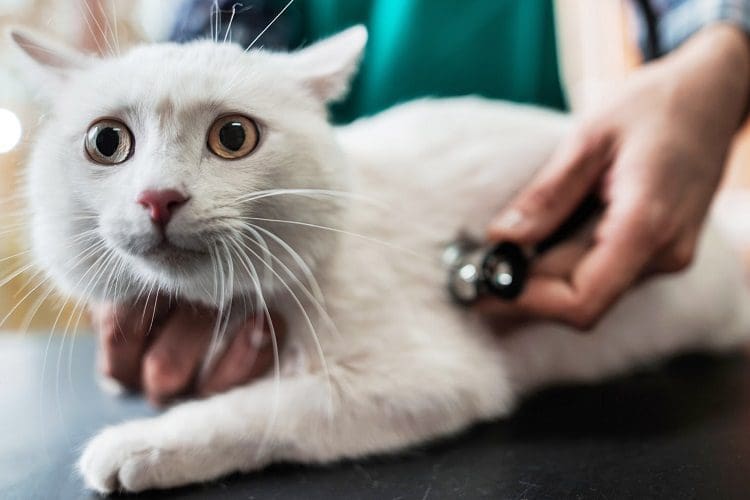
Upper respiratory infections (URI) are common in cats and caused by a wide range of viruses, similar to the cold/flu in humans.
The inflammation in the upper respiratory tract leads to the airways’ narrowing and excess mucus production. The excess mucus also obstructs the nasal passages and makes breathing hard.
All this makes your cat sounds congested when breathing. It can also cause sneezing, runny nose, runny eyes, and lethargy.
Moreover, some cats with a viral infection begin to snore when dreaming or lose appetite due to ulcers.
Fortunately, as PAWs experts explain, “URI is very rarely fatal, and usually resolves within one to three weeks.”
Sick cats still need supportive care. Your vet may also prescribe antibiotics to prevent secondary infection.
And keep in mind that viral infections, such as feline herpesvirus or feline calicivirus, are highly contagious and spread quickly in the cat population. Isolate sick animals as quickly as possible.
Check out this video about URI in cats.
#2 Feline Asthma
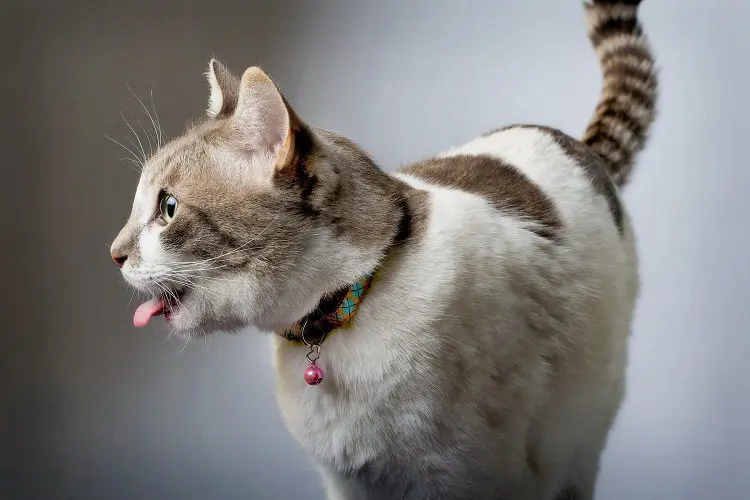
Not only humans have asthma. Domestic cats can also be asthmatic; one of the most common signs is wheezing and loud breathing.
Asthma causes an inflammatory response, resulting in a narrowing of the airways and breathing difficulties.
It’s not uncommon for cats to breathe with their mouths open, cough, hack, or vomit. Rapid breathing is also a common symptom.
According to veterinarians, inhaled allergies are the most common triggers for an asthma attack in cats.
But since cats can be allergic to many things, it can take a while to determine if your cat has feline asthma or another medical condition affecting the lungs/heart.
The usual treatment includes corticosteroids for reducing inflammation and bronchodilators for widening the airways.
Unfortunately, there’s no cure for asthma in cats. But the good news is that cats can live long and healthy lives if they get proper treatment.
Check this video to hear what a cat with asthma sounds like.
#3 Tumor/Cancer
Why is my cat breathing so loud? Unfortunately, sometimes tumors are responsible for your cat’s rapid breathing.
Tumors can grow in all parts of the respiratory system, including the lungs. And if these tumors are large enough, they can obstruct the airways.
Fortunately, many of these tumors aren’t malignant. However, they can cause a lot of discomfort for your cat and damage other organs if the cat can’t breathe well.
So, your cat will need to have surgery to remove the tumor and determine whether it’s cancerous or not.
#4 Brachycephalic Upper Airway Syndrome
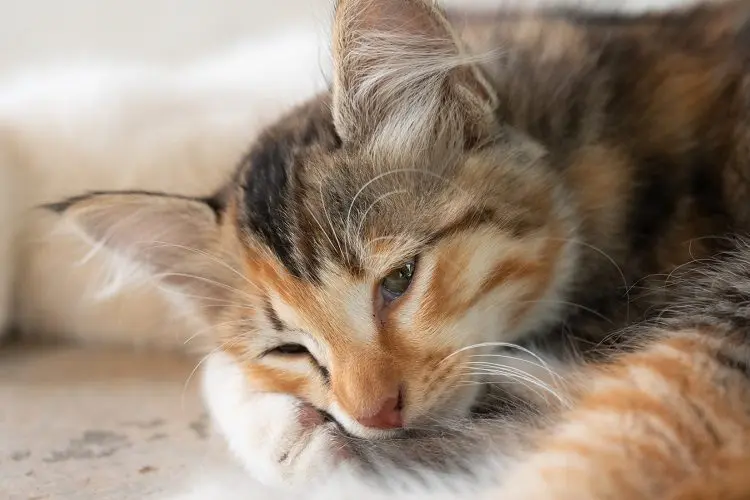
Flat-faced cats, such as Persian cats, Exotics, and Hymalians, are prone to noisy breathing due to their facial structure.
These cats have narrowed nostrils, an elongated soft palate, narrowed airways, or excess laryngeal tissue. Specialists call it Brachycephalic Upper Airway Syndrome.
Due to their physical abnormalities, some of these cats find it easier to breathe with an open mouth, and some snore loudly.
One of the treatment options is surgery. But for cats with mild symptoms, lifestyle changes and proper care are enough to manage the problem.
Watch this video for more details.
#5 Foreign Bodies
Cats are curious creatures, so they often sniff, lick, or eat things they shouldn’t.
And when something gets stuck in your cat’s nasal passages or throat, it’s no wonder your cat sounds congested when breathing.
The congested noise is produced when air passes around the foreign obstruction in the throat/nasal passage.
You should take your cat to the vet to get the foreign object out as soon as possible.
#6 Pneumonia
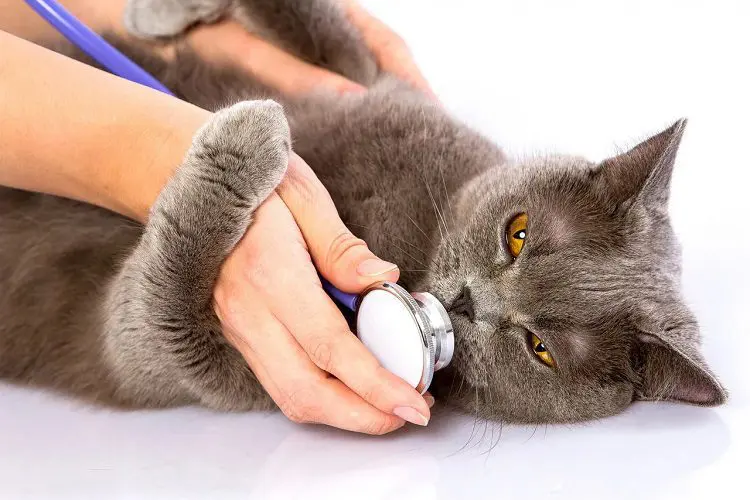
When bacteria, fungi, or viruses attack your cat’s upper respiratory system, sometimes they reach the lower respiratory system – the lungs.
That’s how pneumonia develops in cats. Besides congested breathing, fever, lack of appetite, increased breathing rate, and weight loss are common signs.
Usually, the cat’s immune system can fight off the infection, but seniors, kittens, and cats with chronic diseases are at risk.
Pneumonia can be due to secondary bacterial infection from a viral infection, so you shouldn’t ignore your cat’s flu-like symptoms if they persist.
#7 Congested Heart Failure
If you’re thinking, “My cat sounds congested when breathing,” you should have your cat evaluated for heart problems.
When the heart doesn’t pump blood efficiently, it causes fluids to build up in the chest. The fluids around the lungs prevent your cat’s lungs from expanding when breathing.
Cats with heart problems often have shallow, distressed breathing and a bloated stomach due to the build-up of fluids.
Elderly cats are more likely to develop heart problems, but young animals can have inherited heart disease without showing apparent symptoms.
Unfortunately, heart disease and heart failure are among the top reasons for sudden death in apparently healthy cats.
#8 Fluid Build-Up in the Lungs
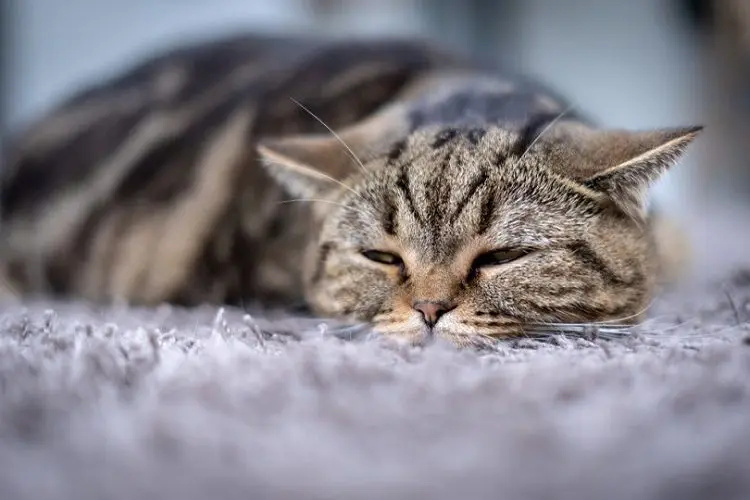
Sometimes, fluids build inside your cat’s lung, a condition known as pulmonary edema. It can be due to congested heart failure, pneumonia, FIP, allergic reactions, trauma, or infectious diseases.
The built-up fluids in the lung’s alveoli make it hard for your cat to breathe, and the body can’t get enough oxygen to function correctly.
It’s a medical emergency, especially if you notice other warning signs that your cat is sick, such as rapid breathing, blue gums, abdominal swelling, and extreme weakness/lethargy.
The extra fluids must be removed so that it doesn’t pressure your cat’s lung and improve your cat’s oxygen levels.
Check this video to see what a cat with fluids in the lungs sounds like, but be warned, it’s difficult to watch.
#9 COPD
“My cat is breathing loudly through the nose.” You should consider lung diseases when you don’t notice the flu-like symptoms accompanying viral or bacterial upper respiratory infections.
COPD stands for chronic obstructive pulmonary disease. It’s a progressive lung disease that restricts the airflow to and from the lungs, making breathing hard.
Usually, COPD manifests with a chronic cough, wheezing, bluish gums, and gagging. The initial symptoms are subtle, so your cat may have severe lung damage when you notice congested breathing.
Unfortunately, COPD can’t be fully treated because the alveoli damage is irreversible. But you can slow down its progression with the right treatment plan.
Some studies conclude that Siamese cats are at higher risk for developing this chronic lung disease, so keep it in mind if you have a Siamese kitty at home.
#10 Hyperthyroidism
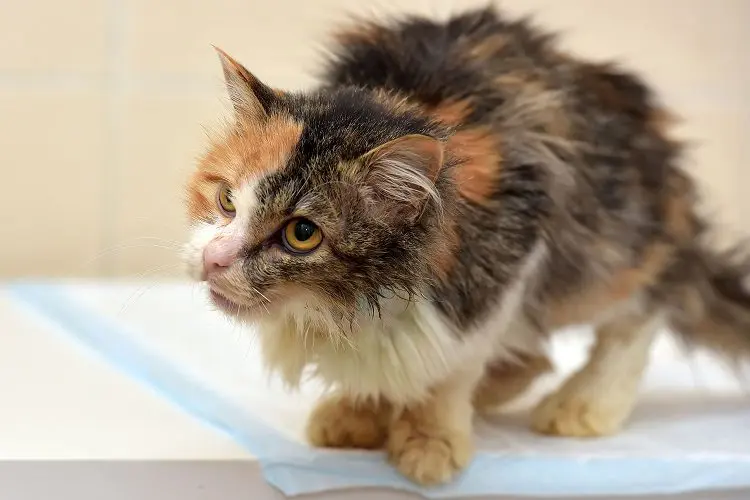
Hyperthyroidism refers to the overproduction of thyroid hormones from the two glands in your cat’s neck.
These glands can obstruct your cat’s airways if they enlarge and expand. So, hyperthyroidism can be why your cat sounds congested when breathing.
Still, more common symptoms of hyperthyroidism are increased thirst/appetite, weight loss, hyperactivity, and aggressive behavior.
#11 Trauma/Shock
If you have an outdoor cat or indoor/outdoor cat, you should also consider trauma and shock as possible reasons for congested breathing.
Serious trauma to the body can damage the airways and lead to the build-up of fluids in or around the lungs, creating wheezing sounds when your cat breathes.
If you suspect your cat has had an accident, you should take your pet to the vet as soon as possible.
#12 Heartworms
Most people think only dogs can get heartworms. While cats aren’t natural hosts for these parasites, they can get infected, albeit rarely.
In cats, heartworm progresses differently than in dogs. For starters, the worms can’t mature inside the cat, so most felines have one to three worms.
Still, since these worms live in the lungs, heart, and blood vessels, they can cause respiratory or organ damage.
Usual signs include asthma-like attacks, coughing, chronic vomiting, and tunability to handle exercise. Cats can’t be treated with the same medication used in dogs, so taking precautions is vital.
Check out this video explanation.
#13 Laryngeal Paralysis
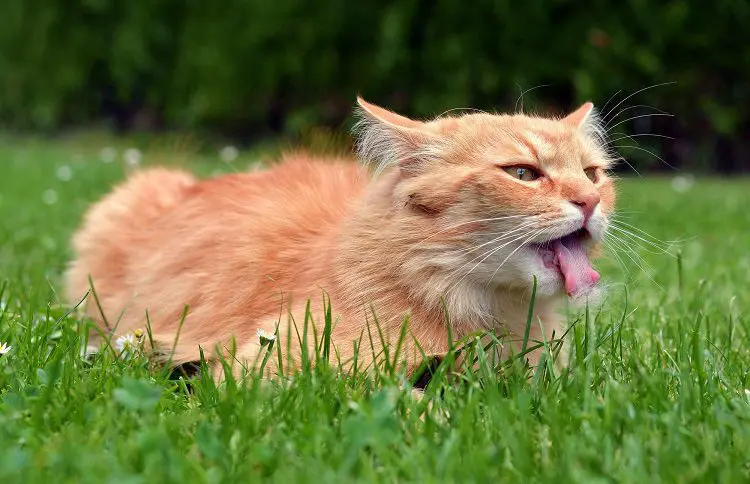
Laryngeal paralysis is a rare condition in cats.
As Maureen H. Kemp, a veterinarian, explains, “The condition occurs when the cartilages of the larynx do not open and close normally during respiration.”
The usual signs are voice changes, dry cough, and noisy breathing. It gets harder for cats to breathe normally, and you may notice vomiting and regurgitation.
Laryngeal paralysis is an inhered condition or an acquired one. So, if your cat has always sounded congested, it can be laryngeal paralysis or another inherited disorder that affects the voice box.
#14 Feline Rhinitis
If your cat has congested breathing and a stuffy nose, you’re likely dealing with feline rhinitis – a nose inflammation. It can be viral or bacterial.
While feline rhinitis doesn’t sound like a severe condition, the inflammation in the nose can make it hard for your cat to breathe. And when cats lack their sense of smell, they are less likely to eat.
Fortunately, your kitty has an excellent chance to recover from feline rhinitis with the proper supportive care and antibiotics if a secondary bacterial infection develops.
However, rhinitis can be chronic due to nasal polyps or other abnormalities in the nose and will need long-term treatment.
#15 Fear/Anxiety
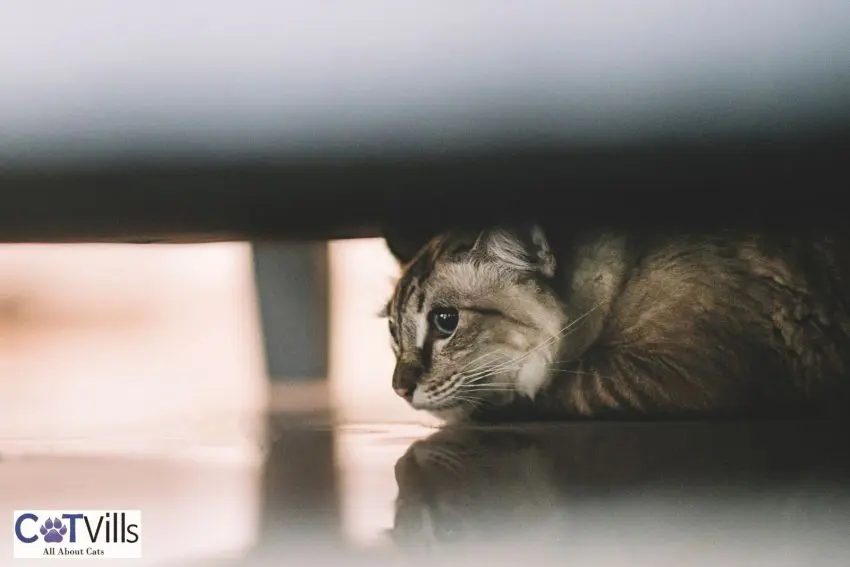
Sometimes cats start breathing heavily to sound congested because they’re scared or anxious.
However, your feline friend’s breathing pattern should return to normal after the panic subsides.
#16 Other Causes
Why does my cat sound congested when breathing? Other possible reasons include poisoning, a side effect of sedation/anesthesia, and neurological problems.
Sometimes cats also pant or breathe with an open mouth because of heat exhaustion or heat stroke. But they will not sound congested.
How Can I Help My Cat With Congested Breathing?
So, your cat is congested, and you’re out of your mind with worry. Can you help your cat at home until you can make a vet appointment?
Here are five tips to help your cat with congestion and heavy breathing.
#1 Get a Humidifier
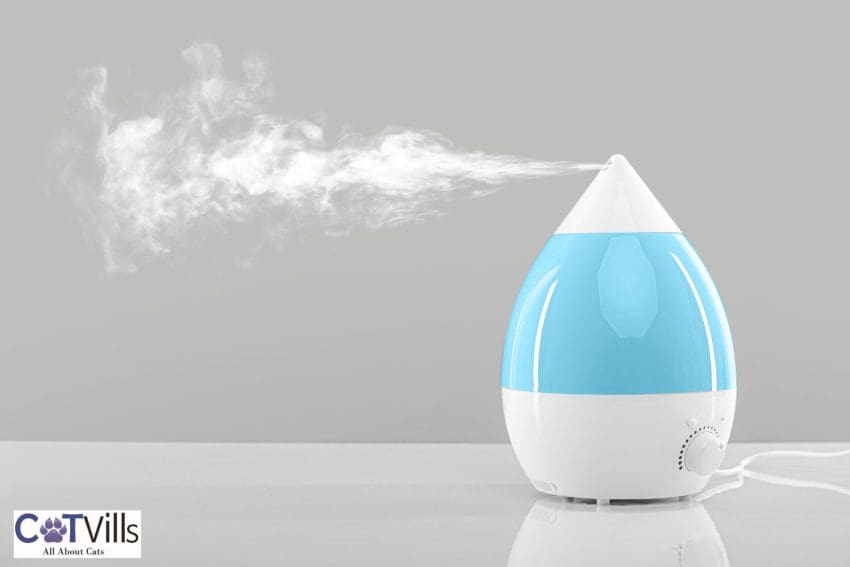
If your cat has congested breathing due to a stuffy nose, you can help ease their discomfort with a humidifier. It will clear the nasal passages and drain some of the excess mucus.
A humidifier also reduces inflammation and dilutes the airways. It’s a handy tool for cats with upper respiratory infections or asthma.
#2 Maintain a Proper Weight
If your cat has a medical condition that makes breathing hard, your kitty is probably less active and at risk of obesity.
Obesity will worsen your cat’s breathing because it puts extra pressure on your cat’s joints and organs. And it puts your cat at risk for other diseases, such as diabetes and heart problems.
So, you should ensure your cat maintains its weight. But avoid strenuous exercise, especially in cats with flat faces.
#3 Learn When to Seek a Veterinary Help
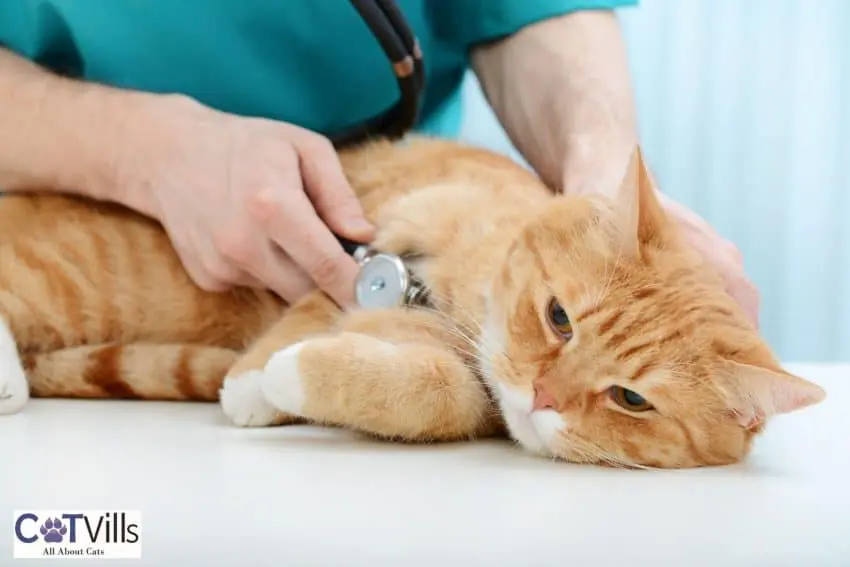
In general, you should seek veterinary help if your cat has congested breathing and doesn’t eat.
Cats can get a turn for the worst if they don’t eat for more than a day.
Also, keep an eye on your cat’s breathing rate – typically, it should be 20 to 30 breaths per minute. Prolonged periods of heavy breathing are a red flag that your kitty is very sick.
Your cat’s sleeping position can also show something wrong with your kitty. Sleeping in a hunched position or meatloaf is an indication that your cat is in pain.
#4 Remove Irritants
For cats with asthma, removing any potential irritants to prevent airway inflammation is the best way to help your cat’s congested breathing.
And keep your cat’s asthma medication close by so that you can react quickly when your cat has an acute asthma attack.
#5 Keep Stress to the Minumum
It’s not good for cats to get stressed when they’re ill. So, when your cat sounds congested, you shouldn’t panic or force your cat to get up from its curled position.
Confine your cat in a quiet room and let them rest while you manage to book an appointment with your vet.
Conclusion
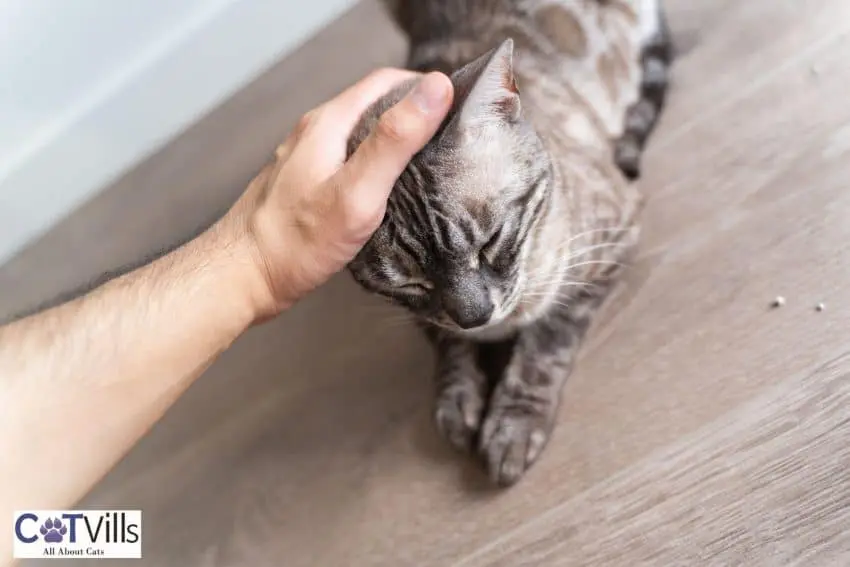
It’s not normal to hear your cat breathing or for cats to pant, wheeze, or snore excessively. These signs show that your cat is sick or something is blocking the airways.
If my cat sounds congested when breathing, I will consult with a vet as soon as possible to rule out a life-threatening disease and get proper treatment.
And keep an eye on your flat-faced kitty. It’s easy for them to tire in hot weather, worsening their breathing pattern.
What do you think about these reasons why cats sound congested when breathing? Has your kitty ever had breathing problems? Tell us about your experience in the comment section.
Resources:
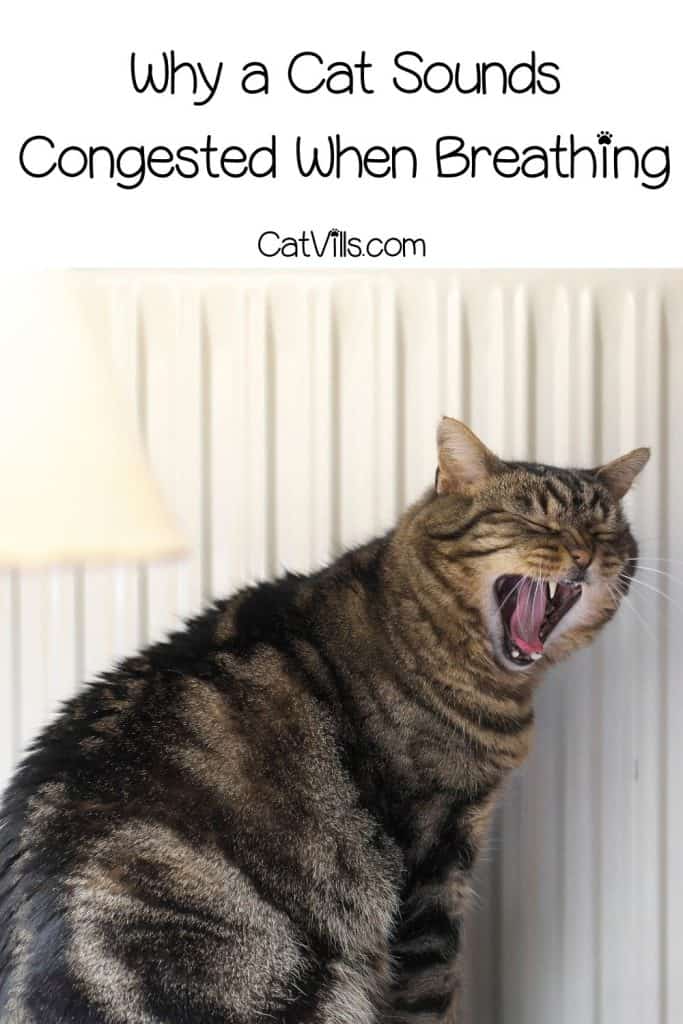

I didn’t know this. I haven’t heard my cat doing anything like this but I will be aware if she does.
I always thought the way a cat purs is so interesting. I loved listening to our cat when we had him. Mr. Otis. I sure do miss him.
This is good information to know! If my cat starts breathing loudly, I’ll take her to the vet right away.
There are so many things that could be wrong with your cat and it’s best to seek medical care. Typically, I wait up to 72 hours before heading to the vet to see if it’s just a cold and resolve itself. However, if there is an emergency, I’d get my cat in sooner.
It seems that there is zero ambiguity when it comes to breathing irregularities and having a vet check out any respiratory issues that crop up is the best route!
I just love your site and your educational posts! My cat sounds congested when breathing at times and I think he may have a hyperthyroid.I noticed the last two weeks he is peeing a lot and drinking a lot and when I looked into it.. a Hyperthyroid was one of the 3 possabilities… he is going to the vet Monday.
Wow I had no idea there were so many possible reasons for cats to sound congested
We have an older cat that goes through regular issues with congestion. It is tough when they struggle and you aren’t sure what it could be.
I love this. I sometimes don’t know when I should or shouldn’t call the vet. This gives me insight as to what might be going wrong.